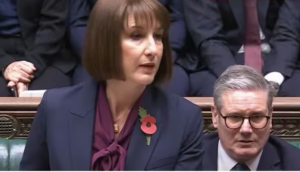Budget 2024: Reeves reveals £40bn in tax rises as she promises to rebuild public services(VIDEO).H
Increases in taxation for businesses and the wealthy form the heart of Labour’s first budget in 15 years
Rachel Reeves has announced £40bn of tax rises on businesses and the rich as Labour’s first budget in 15 years sought to reverse more than a decade of decline in Britain’s public services.
After months of speculation since the party’s general election landslide victory, the chancellor revealed a sweeping package of tax increases she said would be vital to balance the books and turn the page on austerity.

At its heart was an increase in national insurance contributions (Nics) paid by employers worth £25bn by the end of this parliament, alongside billions of pounds in increases from changes to capital gains tax, inheritance tax, VAT on private schools and the non-dom tax regime.
She held back, however, from a 7p-a-litre rise in fuel duty and extending a multibillion-pound freeze in personal tax thresholds, saying she would stand by a manifesto pledge not to increase taxes on working people.
In a historic budget as the first by a female chancellor since the post was created 800 years ago, Reeves said the “difficult” tax-raising choices were required to stabilise the public finances after receiving a dire economic inheritance from the Conservatives.
“To begin a decade of national renewal. To fix the foundations and deliver change, through responsible leadership in the national interest. That is our task, and I know we can achieve it,” she said.
The sweeping changes were expected to draw renewed criticism after Labour pledged during the election campaign that only minimal tax rises were required to deliver its spending plans.
Businesses start making national contributions once a worker earns £5,000, rather than the existing £9,100 threshold, with the rate the employer pays increased by 1.2 percentage points to 15%.
Opposition MPs and business leaders have accused the government of playing fast and loose with its definition of “protecting working people”, warning that hitting employers hard with large tax rises would ultimately affect workers in the form of job losses and lower wages.
Keir Starmer said earlier this week that the government would “embrace the harsh light of fiscal reality” as he blamed the Conservatives for leaving Britain in a dire state after years of economic mismanagement.
Reeves said tax increases were required in the budget after finding a £22bn “black hole” in the public finances she claimed had been covered up by the Tories, which she warned would have persisted over the next five years without immediate action.




